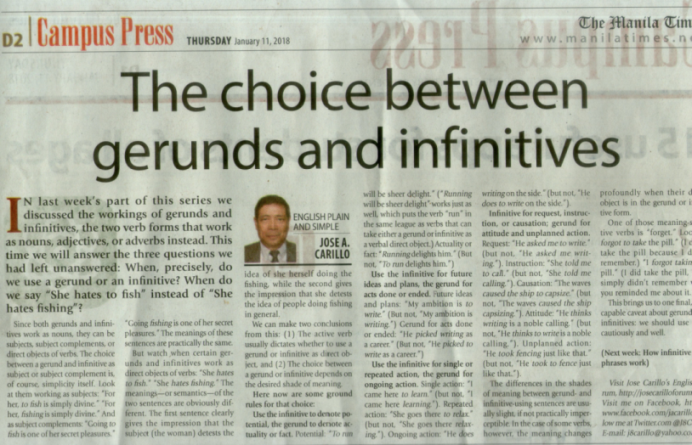In last week’s part of this series we discussed the workings of gerunds and infinitives, the two verb forms that work as nouns, adjectives, or adverbs instead. This time we will answer the three questions we had left unanswered: When, precisely, do we use a gerund or an infinitive? When do we say “She hates to fish” instead of “She hates fishing”?
Since both gerunds and infinitives work as nouns, they can be subjects, subject complements, or direct objects of verbs. The choice between a gerund and infinitive as subject or subject complement is, of course, simplicity itself. Look at them working as subjects: “For her,
to fish is simply divine.” “For her,
fishing is simply divine.” And as subject complements: “Going
to fish is one of her secret pleasures.” “Going
fishing is one of her secret pleasures.” The meanings of these sentences are practically the same.
But watch when certain gerunds and infinitives work as direct objects of verbs: “She
hates to fish.” “She
hates fishing.” The meanings—or semantics—of the two sentences are obviously different. The first sentence clearly gives the impression that the subject (the woman) detests the idea of she herself doing the fishing, while the second gives the impression that she detests the idea of people doing fishing in general.
We can make two conclusions from this: (1) The active verb usually dictates whether to use a gerund or infinitive as direct object, and (2) The choice between a gerund or infinitive depends on the desired shade of meaning.
Here now are some ground rules for that choice:
Use the infinitive to denote potential, the gerund to denote actuality or fact. Potential: “
To run will be sheer delight.” (“
Running will be sheer delight” works just as well, which puts the verb “run” in the same league as verbs that can take either a gerund or infinitive as a verbal direct object.) Actuality or fact: “
Running delights him.” (But not, “
To run delights him.”)
Use the infinitive for future ideas and plans, the gerund for acts done or ended. Future ideas and plans: “My ambition is
to write.” (But not, “My ambition is
writing.”) Gerund for acts done or ended: “He
picked writing as a career.” (But not, “He
picked to write as a career.”)
Use the infinitive for single or repeated action, the gerund for ongoing action. Single action: “I came here
to learn.” (but not, “I came here
learning.”). Repeated action: “She goes there
to relax.” (but not, “She goes there
relaxing.”). Ongoing action: “He
does writing on the side.” (but not, “He
does to write on the side.”).
Infinitive for request, instruction, or causation; gerund for attitude and unplanned action. Request: “He
asked me to write.” (but not, “He
asked me writing.”). Instruction: “She
told me to call.” (but not, “She
told me calling.”). Causation: “The waves
caused the ship to capsize.” (but not, “The waves
caused the ship capsizing.”). Attitude: “He
thinks writing is a noble calling.” (but not, “He
thinks to write is a noble calling.”). Unplanned action: “He
took fencing just like that.” (but not, “He
took to fence just like that.”).
The differences in the shades of meaning between gerund- and infinitive-using sentences are usually slight, if not practically imperceptible. In the case of some verbs, however, the meaning changes profoundly when their direct object is in the gerund or infinitive form.
One of those meaning-sensitive verbs is “forget.” Look: “I
forgot to take the pill.” (I didn’t take the pill because I didn’t remember.) “I
forgot taking the pill.” (I did take the pill, but I simply didn’t remember when you reminded me about it.)
This brings us to one final, inescapable caveat about gerunds and infinitives: we should use them cautiously and well.
This essay, 1074th in the series, appeared in the column “English Plain and Simple” by Jose A. Carillo in the Campus Press section of the January 11, 2017 issue (print edition only) of The Manila Times
, © 2017 by the Manila Times Publishing Corp. All rights reserved.
(Next week:
How infinitive phrases work) January 18, 2018